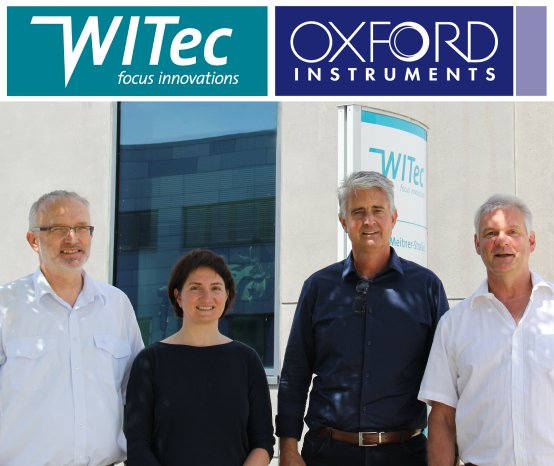Founded in 1997, WITec grew from a small university spin-off into the most innovative Raman imaging company. It made exceptional progress in developing microscopy technology and installed more than a thousand Raman, AFM and SNOM systems worldwide.
“We look back on a 24-year track record of making WITec a prosperous and most innovative Raman imaging company. Now that we are joining the Oxford Instruments Group, we look forward to continuing this success together with a strong partner to grow even faster and to use existing synergies to further expand our reach into the range of markets that will benefit from our wide product portfolio,” Koenen said.
“WITec developed ground-breaking solutions in confocal Raman microscopy and correlative Raman microscopy. Oxford Instruments’ key technologies in AFM and scientific spectroscopic cameras with the brands Asylum and Andor puts WITec in an even better position for future developments,” Hollricher added.
Ian Barkshire, Chief Executive, Oxford Instruments said, “We are delighted to welcome WITec colleagues to Oxford Instruments. WITec’s leading Raman microscopy solutions are a great complement to our existing products and techniques. Raman microscopy is an important and widely used technique across academic and commercial customers for fundamental research, applied R&D and QA/QC. The technique is used in conjunction with and alongside our existing characterization solutions and broadens the capabilities that we can bring to existing customers and expands opportunities into new market areas. Providing a broader range of solutions helps us support our customers in facilitating a greener economy, increasing connectivity, improving health and achieving leaps in scientific understanding.”
Ian Wilcock, Managing Director of Oxford Instruments Nanoanalysis and Magnetic Resonance added, “We look forward to working with our new colleagues at WITec to develop new routes to market for their products. WITec’s RISE Raman for SEM product, for example, will ideally complement our own extensive suite of analyzers for electron microscopes.”
WITec will, of course, fulfill its obligations toward existing customers and business partners in the usual manner and the management team will work to make the transition as smooth as possible.
About WITec
WITec GmbH pioneered 3D Raman imaging and correlative microscopy and continues to lead the industry with a product portfolio that offers speed, sensitivity and resolution without compromise. Raman, AFM and SNOM microscopes, combinations thereof, and WITec-developed Raman-SEM (RISE) systems can be configured for specific challenges in chemical and structural characterization through a modular hardware and software architecture with built-in capacity for expansion. Research, development and production are located at WITec headquarters in Ulm, Germany, and the WITec sales and support network has an established presence in every global region.
About Oxford
Oxford Instruments designs, supplies and supports high technology tools and systems with a focus on research and industrial applications. Innovation has been the driving force behind Oxford Instruments' growth and success for 60 years, supporting its core purpose to address some of the world’s most pressing challenges.
The first technology business to be spun out from Oxford University, Oxford Instruments is now a global company and is listed on the FTSE250 index of the London Stock Exchange (OXIG). Its strategy focuses on being a customer-centric, market-focused Group, understanding the technical and commercial challenges faced by its customers. Key market segments include Semiconductor & Communications, Advanced Materials, Healthcare & Life Science, and Quantum Technology.
Oxford Instruments' portfolio includes a range of core technologies in areas such as low temperature and high magnetic field environments; Nuclear Magnetic Resonance; X-ray, electron, laser and optical based metrology; atomic force microscopy; optical imaging; and advanced growth, deposition and etching. Oxford Instruments is helping enable a greener economy, increased connectivity, improved health and leaps in scientific understanding. Their advanced products and services allow the world’s leading industrial companies and scientific research communities to image, analyse and manipulate materials down to the atomic and molecular level, helping to accelerate R&D, increase manufacturing productivity and make ground-breaking discoveries.

